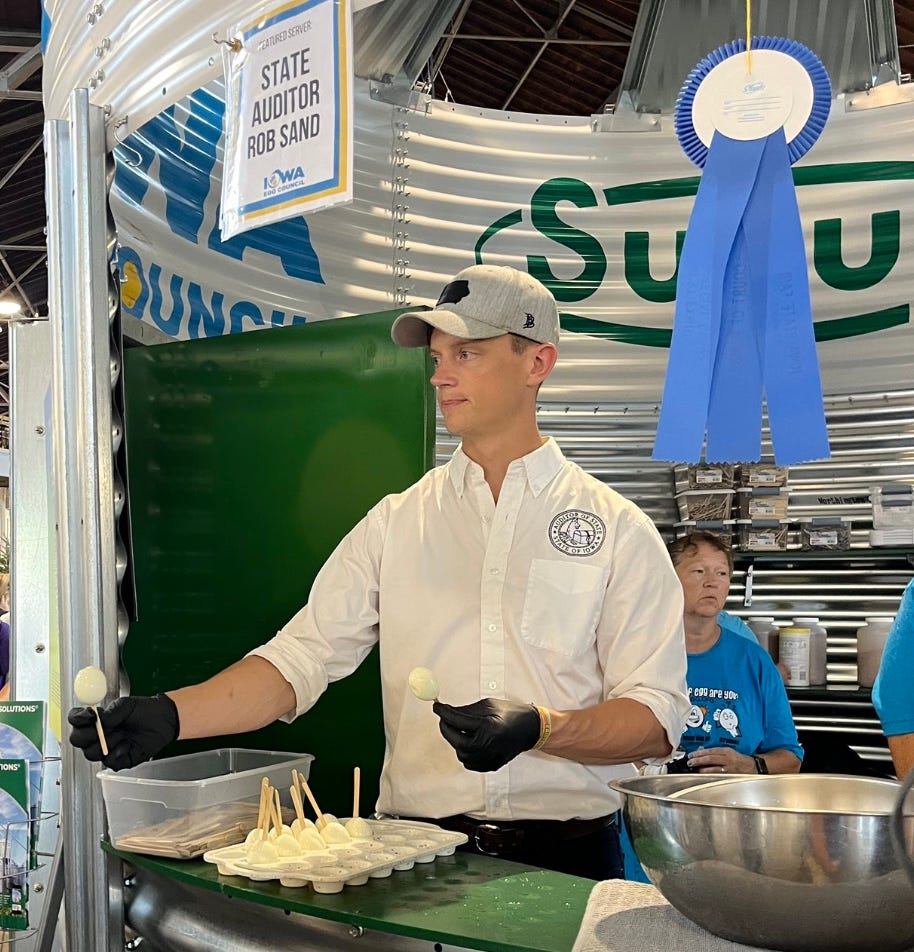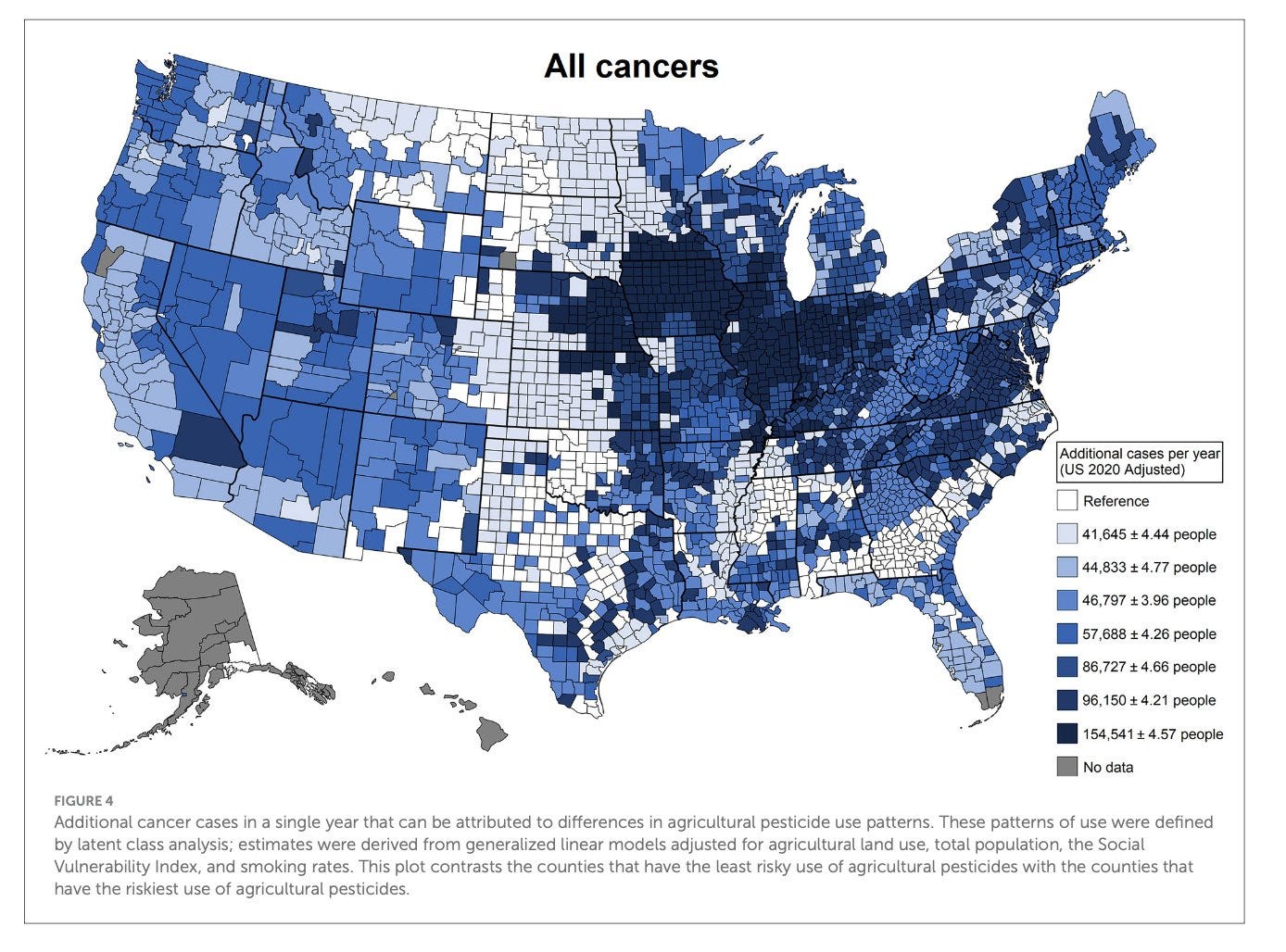I’ve long recognized that Iowa Republicans view my writing as a threat of some sort, like I was trying to score some political points against them that Democrats could use in debate or future elections, or that would otherwise make Rs look bad. If only. This was never the case and is not now. I write for general audiences because I think an information vacuum exists when it comes to Iowa agriculture’s effects on environment and human health, and I felt the public deserved information unvarnished by industry hacks, self-absorbed politicians and the eggshell walkers at the agencies. Why the communication vacuum exists is no more a secret than farmers’ excessive use of nitrogen fertilizer on corn. That is, establishment agriculture feels the need to control the messaging to maintain their right-of-way at their every intersection with Iowans, and they’re willing to exercise their power to maintain that message control.
At least some democratic pols have taken some satisfaction, if not outright glee, that I’ve been an engorged tick between the shoulder blades of some buffoonish Republican farmer-legislators, and because of that, I think they’ve suspected I might be an obedient member of Tribe D. While I indeed think the Republican Party establishment is a rash of festering boils on the American body right now, it should be obvious to all and especially those that know me that I am self-ruled, maybe to a fault. You’re no kind of writer if you aren’t, in my opinion.
Apparently it’s taken some members of Tribe D by surprise that I’ve been willing to poke some fun at them, and just plain poke them, on their cowardice toward water quality and environmental issues in Iowa, especially as they relate to agriculture. A couple of these folks are anointed governor candidate and current state auditor Rob Sand, and his communication director, CJ Peterson. Just who it is that has anointed Sand I’m not exactly sure, but he sure seems to act that way and let me just say his youthful skin does look anointed with something expensive, maybe Dior or Aramis, at least in comparison to my skin which looks anointed by kerosene.
Sand annoys me because he seems incapable of acknowledging, let alone speaking seriously about, the environmental perdition Iowans have been sentenced to by the Big Ag Hydra, and instead wants to brandish the environmental cred he thinks is imparted by deer stand selfies. Me poking fun about this and his JD Vance-sized audiences seems to annoy CJP, who took to Twitter to say I was not a person to be taken seriously and that I was callous to the sacrifice made by people canvassing for three hours, when in fact I’m barely able to afford my kerosene exfoliant on a Substack income supplemented by a monthly $630 pension and an annual $5k in book royalties.
Be assured that whether or not CJP takes me seriously concerns me about as much as a spot of psoriasis on my ass, unresponsive to a kerosene swab. On the other hand, I am highly concerned that Sand and the rest of the Losers of Agistan are poised to yet again ignore the poison in our rivers, lakes and streams as they hope to persuade rurals to guide them out of Iowa’s only wilderness come November. That would be the Minority Wilderness Area where Ds seem destined to wander for 40 years while drinking green water and scavenging spilled corn for sustenance.
So yes, I’m annoyed. But what should outrage every Iowan disgusted with our degraded environment is Sand’s apparent eagerness to pander to the polluters. This was on full display at the Iowa State Fair, where Sand happily took part in the mainly Republican tradition of grilling pork at the Iowa Pork Producer Exhibit, in addition to handing out eggs on a stick at the Iowa Egg Council Booth. For all you libs out there, please don’t notice that Rob could count on two hands the number of old white multi-millionaires (likely all Republicans) that own half of Iowa’s 60 million chickens, or that the 0.13% of Iowans that are Iowa Pork Producer members have opposed regulation of livestock pollution at every turn and have even publicly disputed the fact that livestock pollution has a role in the Gulf of Mexico dead zone.


As the top picture above illustrates, Iowa politicians seem highly drawn to the red apron of IPP. I ask you, what other group that represents 0.13% of Iowa’s population, a group that has polluted our air and water and helped decimate rural Iowa through consolidation, attracts so many shit-eating political grins? And just what is the political calculus here for someone like Sand? It’s easier to understand actual calculus than this. By the way—we’re giving Iowa agriculture a license to pollute (and kill an ocean 1500 miles away) and they still can’t make money on hogs. What’s wrong with this picture???
Enough about Rob and his bodyguard CJ. Anybody else watch Rita Hart announce the vote of the Iowa delegation at the D National Convention (8/20)? How’d you like her using the “Feed and Fuel the World” rhetoric cooked up by that pillar of progressivism, Iowa Farm Bureau Federation?
When Democratic candidates do summon the courage to mention water quality, it’s ALWAYS within the context of “working with farmers and the bureaucracy blah blah and stakeholders and NGOs blah blah and agribusiness and researchers blah blah to funnel (even more) taxpayer money into developing solutions” and NEVER regulating the pollution. Why do we default to the idea that farmers and industry know how to solve this and will see it through, given enough time and government money? Am I out of line asking, if farmers know what to do, why haven’t they done it after the federal government has plowed $45 billion in commodity programs and $7.5 billion conservation payments into Iowa since 1995? Iowa politicians and especially Democrats are playing the public for fools on this issue.
Oftentimes Tribe D is asking us taxpayers to invest in regenerative farming, which is an intuitive idea for better environmental outcomes. But here’s a newsflash: very, very few farmers whose cropped acreage tops 4 figures (and this sort of farmer very likely controls more than half of Iowa farmland) is going to fart around with regenerative agriculture. And even if they were willing, this is a century-scale water quality improvement endeavor without laws to compel adoption. And this is where Ds wilt like a grapevine hit by herbicide drift. They’re cowards. So here’s a free idea for all you Ds out there aspiring to higher office: want regenerative agriculture? Regulate the pollution from the existing production model.
Here’s a nugget of courage for you. I was asked to participate in the “Sacrifice State, Iowa Voices on Environment and Justice” publication created by the Iowa Environmental Council and Drake University Community Press. While reviewing this excellent book, I noticed several comments in the piece from John Askew, a southwest Iowa farmer, former president of Iowa Soybean Association, former EPA Region 7 administrator, and a Republican. Here’s one of them: “I have always believed that the carrot is so much better than the stick. But at this point, sticks are needed.” Try to imagine for a moment somebody like Rita Hart or Rob Sand or anybody else whose name ends in a parenthetical D saying this.
I write this all on the heels of yet another published scientific paper showing the deleterious health effects of living in the heart of corn belt agriculture. To wit: "Our findings show that the impact of pesticide use on cancer incidence may rival that of smoking." Can there be any doubt that Iowans are dying as a result of the existing production system?

So, the question here clearly is: why why why does the Iowa Democratic strategy on water and environment seem to land somewhere between “we just don’t give a damn” and “just be thankful we’re not festering boils,” especially when this is a 70% issue that lands squarely in the middle- and working-class domain?
I’ve reported earlier that audiences at my programs express the same sort of exasperation that I’m expressing here. They’re desperate and feel powerless to effect even the smallest change. Many contemplate leaving Iowa after having spent their whole lives here. Their desperation has in turn affected me.
Many in my circle hold the writer-farmer Wendell Berry in the highest regard when it comes diagnosing the problems with modern agriculture and offering a way out, or a way back, as the case may be. I probably don’t put him on the same pedestal as some others, but there’s no doubt he has written some great things. Some of those great things are in the essay, A Poem of Difficult Hope. The poem itself, On Being Asked to Write a Poem Against the War in Vietnam, by Hayden Carruth, is one of despair. Berry says that “The distinguishing characteristic of absolute despair is silence. There is a world of difference between the person who, believing that there is no use, says so to himself or to no one, and the person who says it aloud to someone else. A person who marks his trail into despair remembers hope—and thus has hope, if even a little.” As I reflect on that passage, I think that is where I’m at when I’m at my worst. I’m not hopeless.
I’ve had several D politicians tell me that there is little they can do in the minority, implying, in Berry’s words, that “if we would help if we could, we will help when we can.” I could hang my hat on that, I really could, and I think most people desperate about this issue could too, if only Iowa Democrats could give us a reason to believe it.
Resources
https://www.stormlake.com/stories/editorials-ag-layoffs,105188
https://www.frontiersin.org/journals/cancer-control-and-society/articles/10.3389/fcacs.2024.1368086/full
https://www.iowapork.org/about-ippa#:~:text=IPPA%20has%20more%20than%204%2C000,county%20organizations%20across%20the%20state.
https://storymaps.arcgis.com/stories/9a43abdb017c4887b73da9a947064db5





Yep...this —>> “By the way—we’re giving Iowa agriculture a license to pollute (and kill an ocean 1500 miles away) and they still can’t make money on hogs. What’s wrong with this picture???”
Chris, I think you have hit the nail on the head (again), but I remain as concerned as you are that the nearly ubiquitous subservience to Big Ag and its primary proponents [not farmers, but the Big Ag investors living fat (figuratively) and far away from the effects of their profit maximizing efforts] are the dominant impediment to meaningful and effective remedies. As you know, Wendell Berry, still fighting the good fight at age 90 from his multi-function diversified farm in Kentucky, highlighted what appears to be the primary problem - the relentless consolidation of farmlands and operations into mega-sized industrial operations with absent owners and focused on single crop production - a trend championed and facilitated starting largely in the 70s by Earl Butz's Ag Dept (when I was in high school). The resistance to production controls through mandatory regulations is strong in part due to the transformation/replacement of the people who control these lands from resident owners to management employees whose total incentive structure is short term profit and operational efficiency maximized through cost controls and their resulting bonuses. Without mandatory regulation of nitrate use and runoff, to name just one area, we remain on the path to environmental catastrophe. The stewards are gone, the single-commodity producers now rule.
As you know, so many economic problems, these included, are complex and interrelated. Gasoline prices and availability affect ethanol programs and production, which affect feed prices and availability for livestock, which affect processing plant production and employment, which affects demand for animal protein products, etc., in a cyclical, spiralling manner. The complex character of these issues facilitates the avoidance by politicians of all stripes of involvement, through advocacy or action, of any real solutions.
It is not just money in politics - although Citizens United was a godsend to agribusiness (as well as to moneyed interests everywhere seeking to maximize cost avoidance) - the causes include the near-term focused self interests of people involved with and dependent upon the ag industry. You cannot blame people for thinking of their family first when it comes to their ability to put food on the table, educate their children, buy and keep a home, and generally stay safe. In light of that hard reality and its susceptibility to manipulative corporate propaganda, any solutions to the longer term, downstream problems will have to include measures that protect the near-term interests of the affected families. Otherwise, we shall be doing nothing but shouting into the wind as we continue to watch the tragedy of the commons play out in front of us.
I support fully efforts to control nitrate pollution from ag operations, but also the other even more poisonous pollutants generated and released indiscriminately into our environment by ag, petrochemical, mining, heavy manufacturing and other industries that privatize profit while socializing substantial costs of their productive processes. This complex set of problems will have to be adressed as you propose - by first reordering our priorities and holding our government representatives to task - an effort that will require at the outset revising our representatives' (and candidates') incentive structures by funding alternative political organizations and support designed to counter the effects of big money interests in our politics. May we all become and remain focused on our community interests in addition to our own.
This war will never be "won" - since it is energized and provisioned by greed and the desire to control - but there are battles to be won if we can marshal the forces of social responsibility. It is the task of every generation.